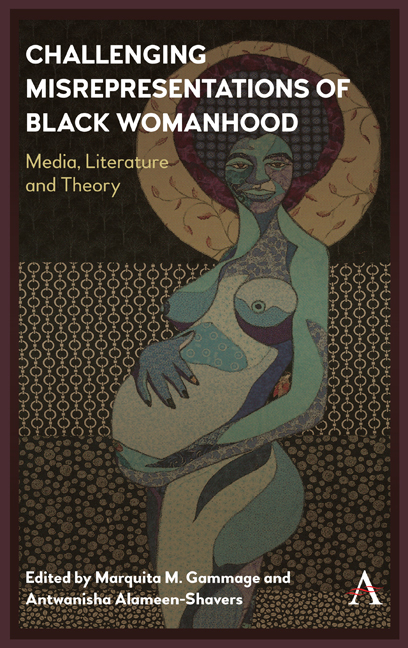Book contents
- Frontmatter
- Contents
- List of Figures
- Acknowledgments
- Introduction
- Chapter 1 Black Student Mothers: A Culturally Relevant Exploratory Study
- Chapter 2 Uninhabitable Moments: The Symbol of Serena Williams, Rage and Rackets in Claudia Rankine's Citizen: An American Lyric
- Chapter 3 “Black Women Are Genius!”: The Image of Celebrated Black Motherhood in Stand-Up Comedy?
- Chapter 4 The Virility of the Haitian Womb: The Biggest Threat to the Dominican Right
- Chapter 5 Ladyhood in Distress: Neoliberalism and Black Politics in Nicole Sconiers's Escape from Beckyville: Tales of Race, Hair, and Rage
- Chapter 6 Sapphires Gone Wild: The Politics of Black Women's Respectability in the Age of the Ratchet
- Chapter 7 Representing the Black Woman as Immoral and Abandoning the Black Family: A Cultural Analysis of Twenty-First-Century Television Dramas Starring Black Women
- Chapter 8 Historical Miseducation on Black Womanhood
- Chapter 9 Michelle Obama Laughs: Political Meme Warfare and the Regurgitation of the Mythological Black Woman
- Chapter 10 Kawaida Womanism as an Interpretative Framework for Understanding Africana Womanhood: Analyzing African American Women's Self-Perceptions
- List of Contributors
- Index
Chapter 3 - “Black Women Are Genius!”: The Image of Celebrated Black Motherhood in Stand-Up Comedy?
Published online by Cambridge University Press: 29 May 2019
- Frontmatter
- Contents
- List of Figures
- Acknowledgments
- Introduction
- Chapter 1 Black Student Mothers: A Culturally Relevant Exploratory Study
- Chapter 2 Uninhabitable Moments: The Symbol of Serena Williams, Rage and Rackets in Claudia Rankine's Citizen: An American Lyric
- Chapter 3 “Black Women Are Genius!”: The Image of Celebrated Black Motherhood in Stand-Up Comedy?
- Chapter 4 The Virility of the Haitian Womb: The Biggest Threat to the Dominican Right
- Chapter 5 Ladyhood in Distress: Neoliberalism and Black Politics in Nicole Sconiers's Escape from Beckyville: Tales of Race, Hair, and Rage
- Chapter 6 Sapphires Gone Wild: The Politics of Black Women's Respectability in the Age of the Ratchet
- Chapter 7 Representing the Black Woman as Immoral and Abandoning the Black Family: A Cultural Analysis of Twenty-First-Century Television Dramas Starring Black Women
- Chapter 8 Historical Miseducation on Black Womanhood
- Chapter 9 Michelle Obama Laughs: Political Meme Warfare and the Regurgitation of the Mythological Black Woman
- Chapter 10 Kawaida Womanism as an Interpretative Framework for Understanding Africana Womanhood: Analyzing African American Women's Self-Perceptions
- List of Contributors
- Index
Summary
Black women are beholden to a set of controlling images that dictate their treatment in a society that has been hell-bent on maintaining power over them since this country's inception. Black women have not had the authority to shape how womanhood has been contextualized or imagined on-or off-screen to the degree that white people have had the autonomy to shape their own images, as well as the stolen sovereignty to shape the identities of people of color. Our participation in generating positive images of ourselves has been historically restricted based on our Blackness and femaleness— a dual impediment for those attempting to break through the mold created by racism and sexism. Comedic expression has proven to be an outlet whereby we can express ourselves through the language of our culture, revealing our unique experiences in the United States steeped in racial violence, poverty and trauma. However, too often we rely heavily on recycled stereotypical scripts borrowed from our oppressors that unsurprisingly do more harm than good. An illustration of this behavior is the representation of Black motherhood in the routines of Black male stand-up comics. At first glance it seems they have a high level of respect and admiration for their mothers and the ways in which they were reared. However, after close examination, what is illuminated through the comedic description of their mothers are gross misrepresentations of Black womanhood that are aligned with previous perversions crafted by the white-power structure to justify and maintain dominance and control over Black female bodies and all their offspring. On the topic of one's culpability in one's own oppression, bell hooks contended that “colonization made of us the colonized— participants in daily rituals of power where we, in strict sado-masochistic fashion, find pleasure in ways of being and thinking, ways of looking at the world that reinforce and maintain our positions as the dominated” (1990, 155). Discussing these types of contradictions, “is to expose our complicity, to expose the reality that even the most politically aware among us are often compelled by circumstances we do not control to submit, to collude” (hooks 1990, 155).
- Type
- Chapter
- Information
- Challenging Misrepresentations of Black WomanhoodMedia, Literature and Theory, pp. 53 - 74Publisher: Anthem PressPrint publication year: 2019

